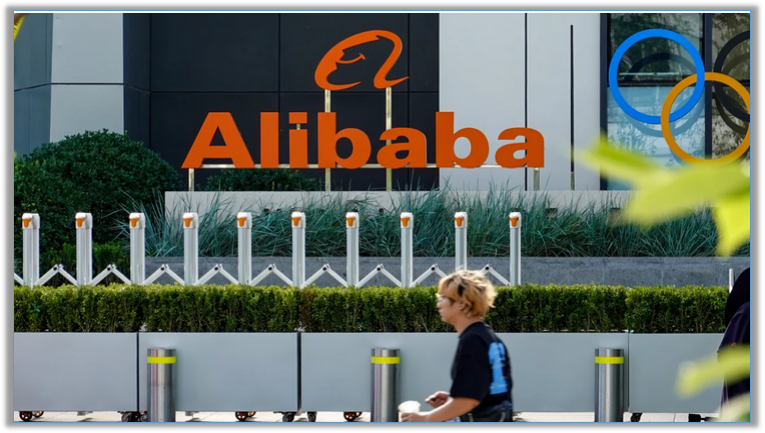Alibaba's share price has broken through an important resistance level, and is expected to rise by 25%
![]() 09/27 2024
09/27 2024
![]() 555
555

Beast Finance's Core Views:
(1) Alibaba has announced its new strategy in AI.
(2) However, Alibaba's AI and cloud businesses still lag behind their American competitors.
(3) Beast Finance's technical analysis of Alibaba stock: Currently, Alibaba's share price is moving towards the upper end of a symmetrical triangle pattern. Therefore, Beast Finance believes that Alibaba's share price will continue to rise, with the first resistance level at $100. If this level is breached, there is a possibility of a move towards the 23.6% Fibonacci retracement level ($114.50).
Since Alibaba recently released its new AI products, its share price has rebounded strongly. It has gained over 3% in Hong Kong and over 4% in the US, reaching a high of over $90 (its highest level since September 6).
Alibaba is enhancing its AI solutions
Alibaba (BABA) is currently accelerating its efforts to enhance its AI solutions. The company recently launched a new open-source AI model and a text-to-video AI technology, aiming to catch up with its American competitors. Following the release of its new AI products, Alibaba's share price has rebounded strongly.
In this regard, Alibaba has been lagging behind Baidu (BIDU). In addition, TikTok's parent company ByteDance, while also lagging behind Baidu, has been heavily investing in AI technology like Alibaba and recently launched a new text-to-video application.
Apart from China's major tech companies, tech giants such as Amazon (AMZN), Microsoft (MSFT), and Google (GOOGL) have also been heavily investing in AI technology in recent years. For example, Amazon recently invested in Anthropic, the parent company of ChatGPT's main competitor Claude.
While Microsoft has already invested in ChatGPT's parent company OpenAI, recent reports suggest that Apple (AAPL) and NVIDIA (NVDA) are considering investing in OpenAI at a valuation of $100 billion. Currently, OpenAI's valuation stands at $150 billion.
Beast Finance believes that some of the reasons why major Chinese tech companies like Alibaba lag behind American competitors like Google, Microsoft, and Amazon in AI technology are related to US government restrictions on semiconductor chip exports to China.
Alibaba is striving to turn losses into profits
After billions of dollars in market value erosion, Alibaba is now seeking to turn losses into profits by focusing on AI technology.
As part of its turnaround efforts, Alibaba has laid off thousands of employees. Bloomberg estimates that the company's workforce has decreased by 20,000 over the past year, and these layoffs may continue in 2024.
In addition, Alibaba has been boosting investor confidence through share repurchases, reducing its outstanding shares from 2.71 billion in 2020 to 2.3 billion. These repurchases aim to increase earnings per share.
Alibaba's recent quarterly financial results show that its business is still not as strong as before. The days of double-digit revenue growth are long gone.
The company's profitability has also continued to decline, with adjusted EBITDA down 1% to $6.19 billion.
Wall Street analysts expect Alibaba's revenue to grow 9.3% this year, exceeding $141.87 billion, and to reach $154 billion by 2025. Earnings per share are expected to decrease from $9.58 last year to $8.85 this year.
Alibaba's cloud computing business is slowing down
Beast Finance believes that one of Alibaba's main challenges is its underperforming cloud computing business. Its revenue grew by just 6% to over $3.6 billion. In comparison, Microsoft's Azure and Amazon's AWS grew by 24% and 17%, respectively, during the same period.
While Alibaba has not disclosed its cloud computing revenue by region, analysts believe that most of its customers are primarily based in China, where it faces fierce competition from companies like Baidu, Huawei, and Tencent.
Worse still, many foreign companies and governments (especially those in the US and Europe) are reluctant to use Chinese cloud providers due to ongoing geopolitical tensions, posing a challenge for Alibaba's international expansion efforts.
Another challenge facing Alibaba is that China's economy is vastly different from what it was a few years ago, when many people made substantial profits from investing in real estate.
Now, with the collapse of the real estate market, many individuals and businesses are struggling. As a result, retail sales continue to decline, and unemployment remains high.
Technical Analysis of Alibaba Stock

The weekly chart shows that Alibaba's share price has been range-bound for the past few months, forming a symmetrical triangle pattern (highlighted in blue on the chart). However, it has now slightly moved above the upper trendline of the triangle.
Currently, Alibaba's share price has breached the 23.6% Fibonacci retracement level ($114.50) but remains slightly above the 50-week moving average.
Therefore, Beast Finance believes that Alibaba's share price will continue to rise.
The first resistance level is expected at $100. If this level is breached, there is a possibility of a move towards the 23.6% Fibonacci retracement level ($114.50).
Wall Street analysts also expect Alibaba's share price in the US to continue rising. The average target price is $108.2, representing a potential upside of approximately 25% from current levels.
Currently, 47 out of the 48 Wall Street analysts covering Alibaba stock have given it a "Buy" rating. The most bullish analysts come from Barclays, UBS, Goldman Sachs, Jefferies, JPMorgan Chase, and Baird, all of whom have given the stock an "Overweight" rating.








